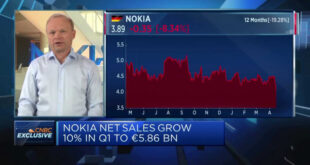
TIZIANA FABI | AFP | Getty Images
Italy’s Interior Minister, Matteo Salvini arrives on October 8, 2018 to the headquarters of the Unione Generale del Lavoro (UGL, General Union of Labor) trade union in Rome.
Italian government bonds are increasingly seen as riskier investments given the anti-establishment Cabinet and its public spending plans — so much so, that Italian bonds are moving closer to being seen to be as risky as Greece’s.
The yield on the 10-year Italian government bond is currently at 3.58 percent — the highest level in over five years.
The yield (or interest rate) on a bond — which is basically a piece of paper that, in this case, a government sells to raise money — indicates the perception that investors have about that investment.
For instance, if the yield on a bond is moving higher, it suggests that investors are associating more risk with that bond and, consequently are demanding a higher rate of interest in return for their investment.
Comparing the Italian 10-year bond to other government bonds in Europe, only Greece has a higher yield. Greece’s yield on the 10-year bond is at 4.64 percent; whereas the equivalent yields in Portugal and Spain are at 1.95 and 1.59 percent, respectively.
The difference between these four yields suggest that Greece and Italy are seen to be riskier than Portugal and Spain.
Italian officials have denied that their spending plans put Rome in a similar situation to the one that Greece experienced back in 2010 and which led to three bailout programs.
 EU News Digest Latest News & Updates
EU News Digest Latest News & Updates


